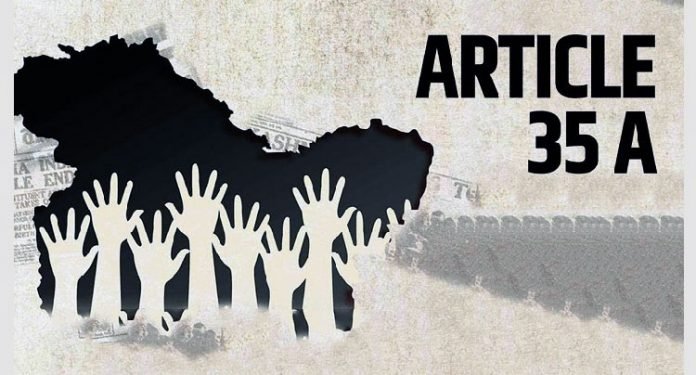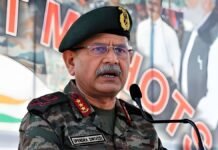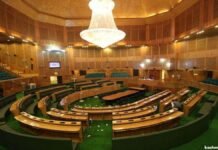
SRINAGAR — The countdown for the removal of the controversial Article 35-A in Jammu and Kashmir has started, according to top sources in the government.
Two days after National Security Adviser Ajit Doval returned from a visit to the Valley, the Centre has decided to move 10,000 additional paramilitary troops there to address the likely fallout of the move on the ground, sources said.
During his three-day tour, Doval had held detailed discussions with senior officers of the State administration, police, paramilitary forces, Army, State and Central intelligence agencies, they said.
“An elaborate contingency plan has been worked out to take care of even the minutest details. How the law and order situation would behave, the response of the overground and underground separatist cadres and also the response of the mainstream political leadership,” they said.
They said, “It is clear that nothing is being left to chance. The orders seem to be clear, violence and attempts to disrupt peace by anti-national elements, in the garb of a public outcry to oppose the abrogation of Article 35-A, has to be contained and controlled so that the common man is put to least inconvenience.”
“The entire operation to deal with the law and order fallout in the aftermath of the abrogation of Article 35-A has even been code-named,” the sources said.
The arrival of additional companies of Central Armed Police Forces (CAPFs) has started in the Valley over the past three days.
Special flights carrying CAPFs have landed at the Srinagar airport during the last three days, while convoys carrying additional companies of these forces are reaching the Valley through the Jammu-Srinagar national highway.
This is reportedly intended to augment an already overwhelming component of these forces in Kashmir. Over 450 companies of CAPFs (40,000 troops) are already deployed for the security of the ongoing Amarnath Yatra and other security related duties in the Valley at present.
“This number does not include the strength of the counter insurgency Rashtriya Rifles, which carries out anti-militancy operations in the hinterland, and also provides peripheral assistance to the State police and the CAPF in difficult situations.
While the Union Home Ministry has issued an order saying that the troops will be for strengthening the “counter insurgent grid” and for maintaining law and order in the Valley, J&K Police said the troops will be deployed in north Kashmir where the security situation is still seen as a challenge.
“All sensitive installations, including the airport, radio station, Doordarshan Kendra, essential services like hydro-power generation projects, power grid stations, water supplies, hospitals, paramilitary camps and the State police offices down to the level of police stations and police posts are getting additional paramilitary deployments for extraordinary security cover.
“The Army would stand by for any assistance the civil administration might require to maintain law and order,” sources said.
Sources also said that the major role in security and law and order maintenance would continue to be shouldered by the State police.
“The NSA has made it clear in his interactions with the State police top brass that the maintenance of law and order is the duty of the State police and all needed support and assistance is being made available to the local police so that they deal with the obtaining situation firmly and effectively,” top sources said.
Informed sources say lists of elements who might try to stoke public outcry have already been prepared. “These anti-national and anti-social elements would be taken into preventive custody so that they are prevented from fomenting trouble,” sources said.
Interestingly, the lists of anti-national and anti-social elements prepared by the State and Central intelligence agencies are not restricted to the separatist cadres.
“Some local politicians who see the ground slipping from under their feet are also on the radar so that they are not able to take political mileage out of the likely situation,” sources said.
Addressing a National Conference workers meeting in Srinagar city on Thursday, former J&K chief minister Omar Abdullah had asked the Centre to wait for the verdict of the Supreme Court where a bunch of petitions challenging Article 35-A and Article 370 are pending.
“Why should you hurry? We will respect the decision of the Supreme Court as we have always done,” Abdullah said.
He also asked the government to clear the air on ‘rumours’ that there would be another long spell of trouble in Kashmir after August 15.
Abdullah said that bureaucrats were spreading rumours asking people to store rations, medicines, fuel for automobiles etc because a long haul of uncertainty was in the offing.
All regional parties of the State, including the National Conference (NC), Peoples Democratic Party (PDP), Jammu and Kashmir People’s Movement (JKPM) and others are opposed to any tinkering with Article 35-A and 370 that give special status to J&K.
Among the centrist mainstream parties, the Bharatiya Janata Party stands for abrogation of these Articles arguing that they are roadblocks not only in the integration of the State with the rest of the country, but also in the development of J&K.
Interestingly, the Congress party wants these Articles to be protected. Congress leaders maintain that senior leaders of the party, including late Prime Minister Jawahar Lal Nehru had painstakingly worked out J&K’s relationship with India through promises made in these Articles.
Follow Us
The Kashmir Pulse is now on Google News. Subscribe our Telegram channel and Follow our WhatsApp channel for timely news updates!










